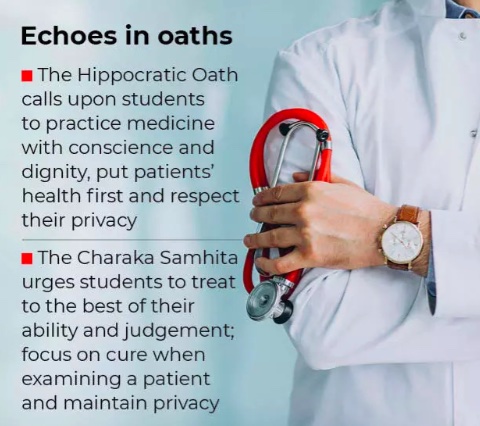Charak Shapath
This is a collection of articles archived for the excellence of their content. Additional information may please be sent as messages to the Facebook community, Indpaedia.com. All information used will be gratefully acknowledged in your name.
This is a collection of articles archived for the excellence of their content. |
Vis-à-vis the Hippocratic Oath
Sushmita Choudhury, February 12, 2022: The Times of India

From: Sushmita Choudhury, February 12, 2022: The Times of India
“No Hippocratic Oath. During white-coat ceremony (with parents), the oath will be 'Maharishi Charak Shapath' present in NMC website,” reads the purported minutes of NMC's discussions with all medical colleges on February 7, which is making the rounds on social media. The Charak Shapath finds mention in the Charaka Samhita.
For the record, the white-coat ceremony is a rite of passage, in which the white doctor’s coat is formally placed on each student’s shoulders at the beginning of their tenure at medical college. The Undergraduate Board of the NMC reportedly wants the change to the Charak Shapath to kick in from the new academic session starting February 14. In addition, all MBBS freshers will need to go through 10 days of yoga training for an hour a day.
Here’s a look at how the Charak Shapath differs from the Hippocratic Oath, the logic behind the switch and how the country is reacting to this move:
What the Charak Shapath says
The pledge by Maharshi Charaka, similar to the Hippocratic Oath, incorporates humanistic principles and outlines the ideal code of conduct for healers. The abridged pledge can be translated as: “Not for self, not for the fulfilment of any earthly desire or gain, but solely for the good of suffering, should you treat your patients and so excel all. Those who sell the treatment of diseases as merchandise gather dust and neglect gold.”
Dr George D’Souza, dean of Bengaluru’s St John’s Medical College Hospital, told TOI that though the NMC had informed colleges about switching to Charak Shapath, it hadn’t published the oath yet.
How it compares to the Hippocratic Oath
In contrast, there is no one single modern version of the Hippocratic Oath. Though the oath has been in existence since the 5th century, it was in the 1500s that German medieval scholars rediscovered and updated the document to adhere to Christian practices.
By the time the oath became a universal practice in the 19th century, it had been significantly tweaked by countries as well as institutions to accommodate shifts in sociocultural practices, convictions and bioethical complexities over the ages.
For instance, the original oath swears by the Greek pantheon, but the modern versions either invoke a generic “god” or simply start with a promise to uphold medical ethics. Most importantly, some of the most controversial aspects of the original oath, such as its explicit mentions against abortion and euthanasia, have been dropped or rephrased in the modern versions.
One of the most popular modern versions is the Declaration of Geneva, adopted by the World Medical Association in 1948 and subsequently amended. In India, the Code of Medical Ethics Regulations has its roots in the Hippocratic Oath.
According to experts, the reason variations of Hippocrates’ text continues to be rewritten and revisited to date is not only because it is the first definition of a code of ethics for the medical profession but also for its literary merits.
Justifications for the Indianisation
“Modern medicine has a history of not more than 200 years. Why should we continue to make doctors take oath in the name of a Greek physician when India has a rich past in medicine?” a council member who didn’t wish to be identified posed to TOI, adding that the matter had been discussed at several meetings. "It should be a matter of pride to take oath in the name of Maharshi Charaka."
Incidentally, the Rashtriya Swayamsevak Sangh (R S S) — a right-wing, Hindu nationalist organisation and the ruling Bharatiya Janata Party’s (BJP) parent body — has long called for replacing the “foreign” Hippocratic Oath with a desi equivalent.
The National Medicos Organisation, affiliated to the R S S, has been informally administering the Charak Shapath to medical students in Gujarat for many years, according to the dean of a medical college in the state.